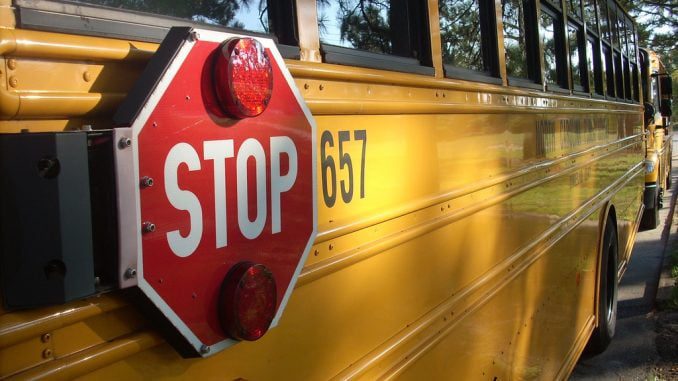
RALEIGH — A group of Democrats serving in the N.C. General Assembly announced Monday that they are drafting legislation that addresses gun violence in schools. Sens. Jay Chaudhuri (D- Wake), Floyd McKissick (D-Durham) and Jeff Jackson (D-Mecklenburg), and Reps. Grier Martin (D-Wake) and Rep. Marsha Morey (D-Durham) held a press conference Monday at the state legislative building to announce the package of policy initiatives.
The press conference came two days before the inaugural meeting of the House Select Committee on School Safety, amid safety concerns after the Parkland, Fla., school shooting in February.
“I don’t want to see us wait until N.C. is in the national headlines because of a school atrocity before we, as a legislature, come to terms with what we need to do,” said McKissick. “It’s expedient if we do it now to avoid that type of crisis.”
Included in their legislative package are:
- Enacting the Extreme Risk Protection Order, which allows families and law enforcement to ask the courts to temporarily remove guns from individuals who endanger themselves or the community
- Expanding universal background checks for assault-style firearms
- Raising the age for the sale of assault weapons to 21
- Banning bump stocks
- Making tip lines available statewide
- Spending more money to increase the number of school psychologists and counselors
- Directing the Center for Safer Schools recommend more funding for school resource officers
“We urge the General Assembly to hold a vote on these common-sense proposals to keep our children safe,” said Chaudhuri. “Our students expect us to do something about this now.”
Similar legislation was signed into law in Florida last week by Republican Gov. Rick Scott after a shooting at a Parkland High School killed 17 people last month. A key difference in the N.C. Democrats’ proposal and that which passed in Florida is that the Florida banned all gun sales to people under age 21.
“This portion of our legislation is actually more moderate than the bill passed and signed into law in Florida by their Republican governor,” said Martin. “This would only ban the sale of assault weapons, not the broader approach, because we firmly believe that assault weapons have no place out in society by those under the age of 21.”
On Wednesday morning, the members of the Select Committee for School Safety will hear presentations from students, the State Bureau of Investigation, the Center for Safer Schools, the N.C. Emergency Management Division, the Task Force for Safer Schools, the N.C. School Psychology Association and Meridian Behavioral Health Services, according to a tentative agenda released Monday.
“We want committee members to absorb as much information as possible prior to a discussion about current law and potential policy proposals,” said Committee co-chair Rep. David Lewis (R-Harnett) in a statement. “This is a comprehensive effort to examine school safety in North Carolina and we appreciate the willingness of so many experts to provide input at our first hearing.”
Committee co-chair Rep. John Torbett (R-Gaston) cautioned members to first allow the committee to get a full picture of how the agencies work together to ensure safety.
“As legislators, our role is to empower law enforcement and educators to provide secure and productive classrooms that keep children safe every day across North Carolina,” said Torbett in a statement.
House speaker Tim Moore (R-Cleveland) formed the bipartisan committee last month. Among the Democrats who held the press conference on Monday, only Jackson is among the 31 Republicans and 17 Democrats appointed to serve on the House select committee. They called for their ideas to be considered by the members.
“The idea is to find common ground between the Democrats and Republicans but to do something real,” said Jackson. “To not just do something at the margins, to actually address this epidemic that we have.”
The proposal also calls for the Center for Safer Schools (CFSS) within the N.C. Department of Public Instruction to survey schools statewide and recommend funding for more school resource officers. When reached for comment, DPI spokesman Drew Elliot said the center already has a statewide survey out on school resource officers and has since before the Parkland shooting. DPI Superintendent Mark Johnson has previously called for more school-based officers and will be working with the House Select Committee closely.
“I support the expansion of funding for School Resource Officers,” said Johnson last month amid some calls to allow teachers to carry guns. “Firearms on school grounds should be in the hands of these trained, uniformed law-enforcement professionals who courageously choose a career protecting citizens from violent threats.”
An armed school resource officer in Maryland is being hailed a hero after he intervened in another school shooting. On Tuesday, a student shot and critically wounded two fellow students and was shot and killed by a campus security officer. After the shooitng at Great Mills High School in St. Mary’s County, Maryland, about 1,600 students were escorted off campus to meet their parents. The officer was not harmed, but the two student victims remain in the hospital in critical condition.
The officer was a trained and paid security official, but interest in a volunteer corps of school resource officers is also growing. Rockingham County, N.C. announced earlier in March that they may be the first county to participate in the Volunteer School Safety Resource Officer Program, created by the N.C. General Assembly in 2013. Volunteer school resource officers must have renewed law enforcement training certified by state law enforcement agencies.
Martin said the lawmakers are drafting their proposal and plan to file it when the full General Assembly returns to Raleigh on May 16.



